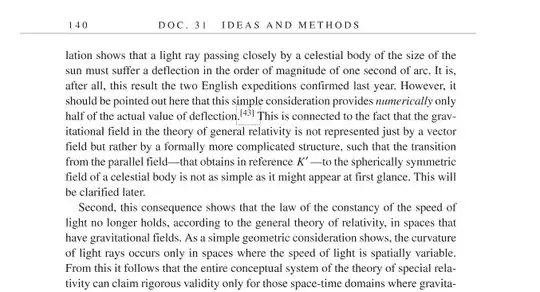At the very centre of the Earth, masses cancel each other out, creating an effective zero-$g$ environment. Would the same happen in a black hole?
3 Answers
For a black hole you cannot simply define a gravitational acceleration as you can with an approximately non-relativistic body. The best you can do is use the geodesic equation to calculate the four-acceleration.
I do this in some detail in my answer to How does "curved space" explain gravitational attraction?. The headline result is that the radial component of the four acceleration is proportional to the Christoffel symbol:
$$ \Gamma^r_{tt} = \frac{GM}{c^2r^2}\left(1 - \frac{2GM}{c^2r}\right) $$
For the gravity to be zero $\Gamma^r_{tt}$ would have to be zero, and in fact as $r \rightarrow 0$ the Christoffel symbol $\Gamma^r_{tt} \rightarrow \infty$. So a black hole has no zero gravity region at its centre.
An object that isn't a black hole has a different metric and different Christoffel symbols. For a uniform sphere of mass $M$ and radius $R$ the Christoffel symbol $\Gamma^r_{tt}$ is given by:
$$ \Gamma_{tt}^r= \frac{r}{2R^6}\left[2M^2r^2+MR^3\left(3\sqrt{1-\frac{2Mr^2}{R^3}}\sqrt{1-\frac{2M}{R}}-1\right)\right] $$
and this does go to zero as $r \rightarrow 0$. That's why such objects do have a region of zero gravity at the centre.
- 367,598
No. At the center of the earth, all of its mass is above you. All that rock and iron is pulling equally on you in all directions, so that there is zero net gravitational pull. But, in a black hole, all of the mass is at the center, to the extent that that has any meaning. No matter how close you are to the center (which is the singularity), all of the mass is still below you.
- 3,965
A hollow black hole?
No, not a hollow black hole. A solid black hole. See the mathspages Formation and Growth of Black Holes where you can read this:
"Incidentally, we should perhaps qualify our dismissal of the "frozen star" interpretation, because it does (arguably) give a servicable account of phenomena outside the event horizon, at least for an eternal static configuration. Historically the two most common conceptual models for general relativity have been the "geometric interpretation" (as originally conceived by Einstein) and the "field interpretation" (patterned after the quantum field theories of the other fundamental interactions). These two views are operationally equivalent outside event horizons, but they tend to lead to different conceptions of the limit of gravitational collapse. According to the field interpretation, a clock runs increasingly slowly as it approaches the event horizon (due to the strength of the field), and the natural "limit" of this process is that the clock asymptotically approaches "full stop" (i.e., running at a rate of zero). It continues to exist for the rest of time, but it's "frozen" due to the strength of the gravitational field. Within this conceptual framework there's nothing more to be said about the clock's existence..."
At the very centre of the earth, masses cancel each other out, creating an effective zero-g environment. Would the same happen in a black hole?
If the frozen-star interpretation is correct, then yes. Remember that a gravitational field is a place where clocks run slower when they're lower. And a clock can't run slower than stopped. People tend to say the Schwarzschild singularity at R=2M is a mere coordinate artefact, and then ignore the fact that the coordinate speed of light at the event horizon is zero. But I haven't seen any convincing explanations as to why. Particularly since Einstein described a gravitational field as a place where the speed of light varies:
IMHO the above suggests that Einstein would have agreed with the frozen-star black hole, and not the point-singularity black hole.
Edit: see Gigi's answer here regarding the infinite gravitational time dilation. The force of gravity at some location in a gravitational field relates to the gradient in the gravitational time dilation at that location.
- 11,381
